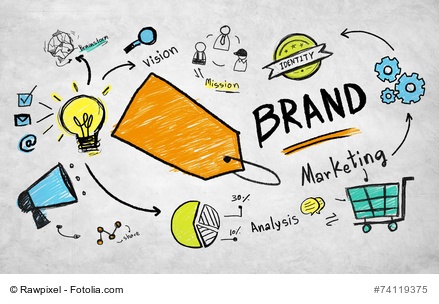
Brands influence our daily buying behavior, as they achieve an optimal recognition value for a product or service. Therefore brands are protected by trade mark law. For the purpose of differentiating between companies, a trademark enables the customer to connect a particular product or service with a certain company on the market.
The Benefits of Your Own Brand
Companies try to connect their products and services to a recognizable brand to make them stand out of competitive products. Achieving a recognition value for a trademark is very important, as a trademark creates emotional binding and subjective expectations. Additionally, the customer individually connects his quality perceptions and experiences with the product.
This leads to a competitive advantage for a company: A great name recognition of a brand causes positive thought processes. The more positive the customer?s attitude, the more economic value the brand gains. The trademark therefore provides information about a company?s popularity and can even be understood as its flagship.
To sum it up, the main benefits of an established brand are:
- the differentiation from competition
- a recognition value and the possibility of emotional binding
- the protection against imitation, which is achieved by registering the trademark
It should always be noted that a brand is registered just for certain goods or services. This means that different companies can legally use the same brand, if the trademark labels different goods or services. This has to be specified in the application of the trademark.
The registration protects the brand for a time of 10 years. Afterwards an extension can be applied. In contrast to other property rights, there?s no limitation for a trademark?s duration.
How to Define a Trademark
A trademark is a symbol attracting attention and characterizing a product. Words, illustrations, characters, numbers, colors, acoustic designs as well as three-dimensional forms, including the shape of goods or of their packaging etc., can all be used in a brand. The manifold appearances resulted in different kinds of trademarks, such as the design mark, word mark etc.
Non-registered trademarks can obtain protection through their use. However, when the trademark is infringed, it is often extremely complex to document the use of a non-registered trademark.
Registered trademarks officially prove a company?s right to solely use a brand within a certain time and a certain area. So a lot of money and effort can be saved, as it is a lot easier to document the use of a registered trademark.
Reasons to Refuse a Trademark Registration
Not every term or sign can be registered as a trademark. The fundamental requirement is distinctiveness: A trademark must provide the opportunity to differentiate goods and services offered by different companies.
To avoid a rejection of your trademark application, consider the following ?reasons for refusal?- checklist:
- Terms, which are generally used in everyday speech, for example ?pasta?, have to be free to use, therefore they are excluded from trademark registration in Germany
- The trademark is not allowed to contain information about: the general use of the product, such as composition, quantity, provision, value, time and place of the production
- The trademark must not contain banners, flags, national emblems, or seals
- Also a trademark must not contain official testing and guarantee licenses
- The brand is further not allowed to provide any wrong information about the product
- You are not allowed to apply for a trademark, if there is an identical, older trademark already registered and used for identical products and services
How Can I Register My Brand?
Keep in mind the principle of ‘first come, first served’. Before developing a trademark, at least before preparing the application, do a research: Inform yourself on time about already registered trademarks, to avoid law violations. The trademark applicant has to ensure that his brand is new and not already in use.
You can submit the application for a trademark in Germany at every DPMA (Deutsches Patent- und Markenamt) department. The application date fixes the starting point of the trademark?s protection.
To avoid mistakes, which could cause the rejection of the application, contact a qualified trademark attorney in advance. He/She will not only give you advice on the procedure, but also support you by monitoring and enforcing your rights after registering the trademark.
What problems did you face while registering a trademark? Do you have any suggestions for other applicants?







Leave a Reply